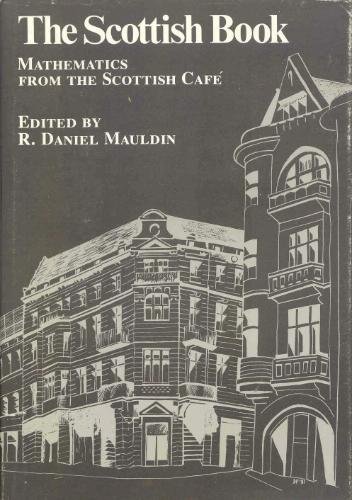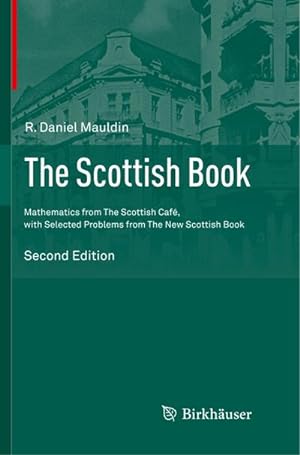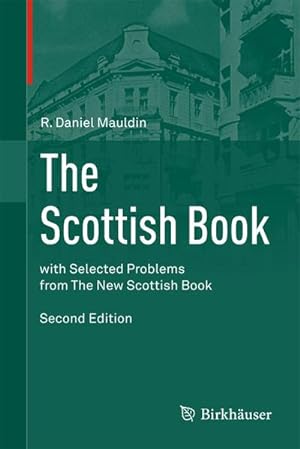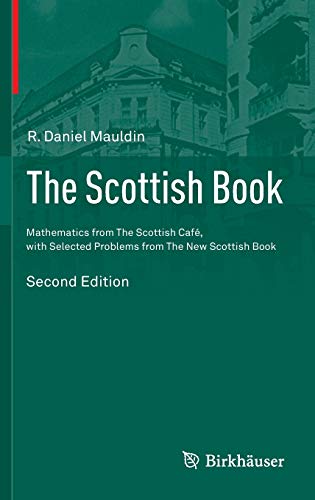scottish book mathematics café von mauldin (8 Ergebnisse)
FeedbackSuchfilter
Produktart
- Alle Product Types
- Bücher (8)
- Magazine & Zeitschriften (Keine weiteren Ergebnisse entsprechen dieser Verfeinerung)
- Comics (Keine weiteren Ergebnisse entsprechen dieser Verfeinerung)
- Noten (Keine weiteren Ergebnisse entsprechen dieser Verfeinerung)
- Kunst, Grafik & Poster (Keine weiteren Ergebnisse entsprechen dieser Verfeinerung)
- Fotografien (Keine weiteren Ergebnisse entsprechen dieser Verfeinerung)
- Karten (Keine weiteren Ergebnisse entsprechen dieser Verfeinerung)
- Manuskripte & Papierantiquitäten (Keine weiteren Ergebnisse entsprechen dieser Verfeinerung)
Zustand
Einband
Weitere Eigenschaften
- Erstausgabe (1)
- Signiert (Keine weiteren Ergebnisse entsprechen dieser Verfeinerung)
- Schutzumschlag (Keine weiteren Ergebnisse entsprechen dieser Verfeinerung)
- Angebotsfoto (2)
Sprache (1)
Preis
- Beliebiger Preis
- Weniger als EUR 20 (Keine weiteren Ergebnisse entsprechen dieser Verfeinerung)
- EUR 20 bis EUR 45 (Keine weiteren Ergebnisse entsprechen dieser Verfeinerung)
- Mehr als EUR 45
Gratisversand
Land des Verkäufers
Verkäuferbewertung
-
The Scottish Book : Mathematics from the Scottish Cafe
Anbieter: Better World Books, Mishawaka, IN, USA
Erstausgabe
EUR 58,94
Währung umrechnenEUR 9,00 für den Versand von USA nach DeutschlandAnzahl: 1 verfügbar
In den WarenkorbZustand: Good. 1st. Used book that is in clean, average condition without any missing pages.
-
The Scottish Book: Mathematics from the Scottish Cafe
Anbieter: Zubal-Books, Since 1961, Cleveland, OH, USA
EUR 54,47
Währung umrechnenEUR 19,81 für den Versand von USA nach DeutschlandAnzahl: 1 verfügbar
In den WarenkorbZustand: Fine. First edition, first printing, 268 pp., Hardcover, very good in a faintly worn else very good dust jacket. - If you are reading this, this item is actually (physically) in our stock and ready for shipment once ordered. We are not bookjackers. Buyer is responsible for any additional duties, taxes, or fees required by recipient's country.
-
The Scottish Book: Mathematics from the Scottish Cafe
Anbieter: Riverby Books (DC Inventory), Fredericksburg, VA, USA
EUR 97,61
Währung umrechnenEUR 38,77 für den Versand von USA nach DeutschlandAnzahl: 1 verfügbar
In den Warenkorbhardcover. Zustand: Good. Hardcover with dust jacket. DJ is is good condition, minor tear and rear crown of spine, chipping/rubbing around edges, but protected by a mylar cover. Previous owners name discreetly on front free endpaper, pages beginning to tone. Minor water damage at top of 1-4th pages. Overall good condition. No date on the title page. Copyright page dated 1982. 268 pages. We are a real brick and mortar bookstore and ship books everyday. This listing was written by an actual person with the book in front of them for inspection. Please email with questions or to request photographs.
-
The Scottish Book: Mathematics from The Scottish Café, with Selected Problems from The New Scottish Book
Anbieter: Ria Christie Collections, Uxbridge, Vereinigtes Königreich
EUR 140,73
Währung umrechnenEUR 5,75 für den Versand von Vereinigtes Königreich nach DeutschlandAnzahl: Mehr als 20 verfügbar
In den WarenkorbZustand: New. In.
-
The Scottish Book : Mathematics from The Scottish Café, with Selected Problems from The New Scottish Book
Verlag: Springer International Publishing, Springer International Publishing, 2019
ISBN 10: 3319794329 ISBN 13: 9783319794327
Sprache: Englisch
Anbieter: AHA-BUCH GmbH, Einbeck, Deutschland
EUR 149,79
Währung umrechnenKostenlos für den Versand innerhalb von/der DeutschlandAnzahl: 1 verfügbar
In den WarenkorbTaschenbuch. Zustand: Neu. Druck auf Anfrage Neuware - Printed after ordering - The second edition of this book updates and expands upon a historically important collection of mathematical problems first published in the United States by Birkhäuser in 1981. These problems serve as a record of the informal discussions held by a group of mathematicians at the Scottish Café in Lwów, Poland, between the two world wars. Many of them were leaders in the development of such areas as functional and real analysis, group theory, measure and set theory, probability, and topology. Finding solutions to the problems they proposed has been ongoing since World War II, with prizes offered in many cases to those who are successful.In the 35 years since the first edition published, several more problems have been fully or partially solved, but even today many still remain unsolved and several prizes remain unclaimed. In view of this, the editor has gathered new and updated commentaries on the original 193 problems. Some problems are solved for the first time in this edition. Included again in full are transcripts of lectures given by Stanislaw Ulam, Mark Kac, Antoni Zygmund, Paul Erdös, and Andrzej Granas that provide amazing insights into the mathematical environment of Lwów before World War II and the development of The Scottish Book. Also new in this edition are a brief history of the University of Wroclaw's New Scottish Book, created to revive the tradition of the original, and some selected problems from it.The Scottish Book offers a unique opportunity to communicate with the people and ideas of a time and place that had an enormous influence on the development of mathematics and try their hand on the unsolved problems. Anyone in the general mathematical community with an interest in the history of modern mathematics will find this to be an insightful and fascinating read.
-
The Scottish Book : Mathematics from The Scottish Café, with Selected Problems from The New Scottish Book
Verlag: Springer International Publishing, 2015
ISBN 10: 331922896X ISBN 13: 9783319228969
Sprache: Englisch
Anbieter: AHA-BUCH GmbH, Einbeck, Deutschland
EUR 149,79
Währung umrechnenKostenlos für den Versand innerhalb von/der DeutschlandAnzahl: 1 verfügbar
In den WarenkorbBuch. Zustand: Neu. Druck auf Anfrage Neuware - Printed after ordering - The second edition of this book updates and expands upon a historically important collection of mathematical problems first published in the United States by Birkhäuser in 1981. These problems serve as a record of the informal discussions held by a group of mathematicians at the Scottish Café in Lwów, Poland, between the two world wars. Many of them were leaders in the development of such areas as functional and real analysis, group theory, measure and set theory, probability, and topology. Finding solutions to the problems they proposed has been ongoing since World War II, with prizes offered in many cases to those who are successful.In the 35 years since the first edition published, several more problems have been fully or partially solved, but even today many still remain unsolved and several prizes remain unclaimed. In view of this, the editor has gathered new and updated commentaries on the original 193 problems. Some problems are solved for the first time in this edition. Included again in full are transcripts of lectures given by Stanislaw Ulam, Mark Kac, Antoni Zygmund, Paul Erdös, and Andrzej Granas that provide amazing insights into the mathematical environment of Lwów before World War II and the development of The Scottish Book. Also new in this edition are a brief history of the University of Wroclaw's New Scottish Book, created to revive the tradition of the original, and some selected problems from it.The Scottish Book offers a unique opportunity to communicate with the people and ideas of a time and place that had an enormous influence on the development of mathematics and try their hand on the unsolved problems. Anyone in the general mathematical community with an interest in the history of modern mathematics will find this to be an insightful and fascinating read.
-
The Scottish Book: Mathematics from the Scottish Café, With Selected Problems from the New Scottish Book
Anbieter: Revaluation Books, Exeter, Vereinigtes Königreich
EUR 219,40
Währung umrechnenEUR 11,54 für den Versand von Vereinigtes Königreich nach DeutschlandAnzahl: 2 verfügbar
In den WarenkorbPaperback. Zustand: Brand New. 2nd reprint edition. 340 pages. 9.25x6.10x0.77 inches. In Stock.
-
The Scottish Book: Mathematics from the Scottish Café, With Selected Problems from the New Scottish Book
Anbieter: Revaluation Books, Exeter, Vereinigtes Königreich
EUR 221,37
Währung umrechnenEUR 11,54 für den Versand von Vereinigtes Königreich nach DeutschlandAnzahl: 2 verfügbar
In den WarenkorbHardcover. Zustand: Brand New. 2nd edition. 340 pages. 9.75x6.75x0.75 inches. In Stock.






